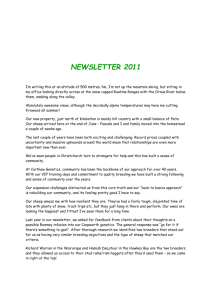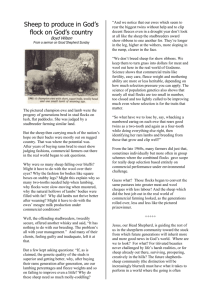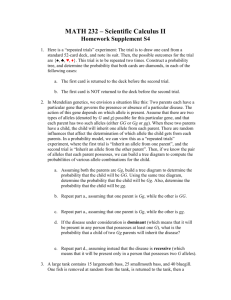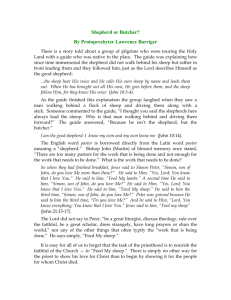Wolves_in_Sheep`s_Clothing
advertisement
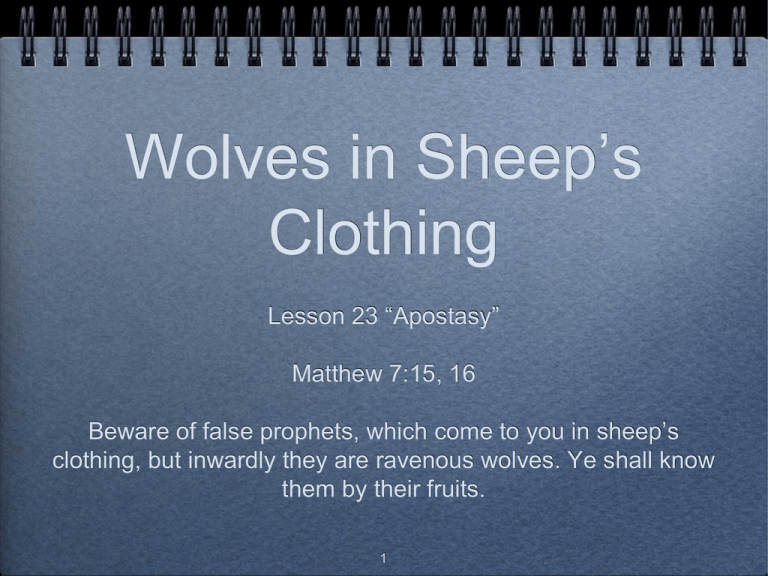
Wolves in Sheep’s Clothing Lesson 23 “Apostasy” Matthew 7:15, 16 Beware of false prophets, which come to you in sheep’s clothing, but inwardly they are ravenous wolves. Ye shall know them by their fruits. 1 What is more dangerous, a sheep 2 3 or a wolf? 4 5 Or, maybe, a wolf in sheep’s clothing? 6 7 What are some characteristics of wolves? 8 Ravenous--really hungry! 9 They howl to assemble the pack, to pass an alarm, to locate each other, and to communicate across great distances. They are predators and hunt by wearing their prey down in short chases. 10 Sheep, on the other hand, do not hunt. They graze. 11 They have excellent skills, however. They have good hearing and are sensitive to noise. They have excellent peripheral vision (their pupils are horizontal slits) and can see behind themselves without turning their heads, but they have poor depth perception, and shadows and dips in the ground may cause them to balk. When disturbed, they prefer to move uphill where it is more well-lit than the shadowy dips. 12 They have an excellent sense of smell. Sheep have a herd mentality which means they prefer to be in a flock rather than to be solitary. 13 14 Sheep, however, have little ability to defend themselves and are easy prey. Their primary defense is to flee from danger. 15 16 Jesus said false prophets are like ravenous wolves in sheep’s clothing. Why do you think he made this comparison? False prophets aren’t going to eat you, are they? But they want something from you. What is it? 17 Remember, sheep are not loners. They like to flock together, and they like to follow a leader. A false prophet it looking for a following, and sheep are the perfect followers! That is why a shepherd is so important. 18 19 If the Sheep know their leader and know that he or she will take them to green pastures and good water, they will follow the shepherd. Sheep are not driven, or herded, but are led. If the shepherd regularly feeds them, all he has to do is carry a bucket of feed, and they will follow him. 20 Jesus, however, wants us to be intelligent sheep! We are not to agree with everything we hear about spiritual matters. We are to think first and compare it with Scripture! That is why he next said we will know the false prophets by their fruits. We are to be discerning and not follow anyone or anything without first testing the person or the doctrine. Can you think of some examples of false teachings? 21 Can you think of some examples of false teachings? 1. Sunday sacredness 2. Trinitarian doctrine 3. Immortal soul 4. Purgatory 5. Confession to a priest 22 Through the two great errors, the immortality of the soul and Sunday sacredness, Satan will bring the people under his deceptions. (The Great Controversy, p. 588) 23 The Scriptures are our only safeguard. None but those who have fortified the mind with the truths of the Bible will stand through the last great conflict. (The Great Controversy, p. 593) The truth and the glory of God are inseparable; it is impossible for us, with the Bible within our reach, to honor God by erroneous opinions. (Ibid., p. 597) 24 Our Great safeguard! 25 Credits: Slide 3: Kevin Law Slide 5: Robert Dewar Slide 7: Pierre Tourigny 26



